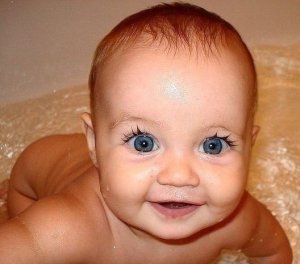
All iLive content is medically reviewed or fact checked to ensure as much factual accuracy as possible.
We have strict sourcing guidelines and only link to reputable media sites, academic research institutions and, whenever possible, medically peer reviewed studies. Note that the numbers in parentheses ([1], [2], etc.) are clickable links to these studies.
If you feel that any of our content is inaccurate, out-of-date, or otherwise questionable, please select it and press Ctrl + Enter.
Children learn a sense of humor from their parents
Last reviewed: 01.07.2025
 ">
">It turns out that a child's sense of humor is inherited from his parents.
American scientists from Johnson State College and the University of New Hampshire conducted a series of observations of the reactions of 6-12 month old babies to their parents' laughter. It turned out that children closely monitor the reaction of their mothers and fathers when they laugh and try to laugh at the same moment.
The study involved 30 toddlers. Their reactions to normal and absurd situations were recorded. During the absurd situations, the children sought support from their parents and turned to them for a kind of emotional guidance. Scientists call this emotional attachment.
It was previously found that children seek support from their parents in dangerous situations using the same principle. If they see that their father or mother is afraid, they also begin to worry and be afraid.
Children's sense of humor develops a little later, and experts have finally figured out what motivates children when they laugh.
During the experiment, two similar situations were played out in front of mothers and their six-month-old children. The presenter showed them a book with pictures, holding a red ball in his hand. The mothers, as was agreed upon in advance, did not show any emotions and sat quietly. But then the situation became ridiculous: the presenter put the book on his head, put on a red nose and started humming something. The mothers started laughing (according to the instructions).
Not all the children began to pick up on their mother's joy, but most of them watched their reactions closely.
This is how, according to scientists, the connection between an absurd situation and the correct response to it is formed. Thus, children tend to repeat this social model of behavior in the future.
"Already at the age of six months, children see their parents' reactions to different situations; for them, moms and dads are a source of emotional information and an example of behavior. Babies accumulate enough life experience by 12 months, and then they develop their own opinion, which is no longer so dependent on the reactions of their parents. At least, a child can distinguish an ordinary situation from a funny one," say the authors of the study.
